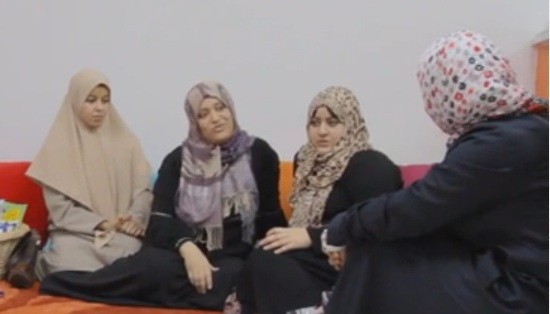[vc_row][vc_column width=”1/1″][vc_column_text]
Libyan teacher brings women into democratic process
By Maggie Farrand
[/vc_column_text][/vc_column][/vc_row][vc_row][vc_column width=”2/3″][vc_column_text]

Before February 2011, Hoda Mohamed El-Suqoori never would have thought she would become a political activist or start her own organization. She was just a high-school teacher in Ajdabya, a small town on the Libyan coast.
When the Arab Spring heated up in this North African country, she knew she needed to do more. The subsequent revolution gave her the opportunity.
Hoda formed the National Organization to Counter Tribal and Regional Intolerance, an organization seeking to counter biases and encourage a more united and patriotic Libyan populace.
The organization’s first initiative: provide more opportunities for women to participate in regional and national politics.
Through a small grant from Creative Associates International’s Community Driven Grants Program (CDGP), Hoda opened a women’s center in her town of Ajdabya in northeastern Libya. CDGP is funded by the Middle East Partnership Initiative of the US State Department.
New opportunities for women
At the center, women were invited to gather and exchange ideas. At times female activists shared their stories. Attendees could also learn about their civic rights and Libya’s changing political system.
The center featured a library – the first in Ajdabya – and an IT center where women could learn computer skills.
Initially, 20 women joined the center. Within a few months, membership swelled to more than 60 members.
The women’s center “gave us a real chance to help women in Ajdabya understand the meaning of elections and how important their contribution is,” Hoda explains.
Libyan women, Hoda realized, avoided politics not because they didn’t care, but because they had never been given the chance.
With the fall of Col. Muammar Gaddafi’s 42-year regime, Libya was about to enter a period of reform, defined largely by its own people. Hoda and her newly formed organization hoped to provide the uneducated women in her country a chance to join in.
Taking the next step in political activism
Libyans established a Constitutional Declaration, which declared Libya a democracy and guaranteed human and women’s rights.
In July 2012, the country led its first national elections, for the 200 seats of the new General National Congress, and women were no longer taking a back seat.
After decades of being denied a political voice, Libyan women began speaking their demands and taking advantage of opportunities to become more involved in the political process.
“Women want what is due to them,” said Fatima Ghandour, a radio talk-show host at Radio Libya, in a 2012 interview.
In the elections, four women from Hoda’s center became election monitors. Two women decided to enter the race as candidates – including Hoda.
Although Hoda did not win her election, she knows it was an important step in her own development as a political activist and a message to the community that women can be involved in the process as well.
“I’m proud of the experience of my elections,” she says. “I didn’t win the elections but I’m proud of my contribution in such a great event that took place in Libya after four decades of injustice. That was really an honor for me.”
Looking forward to the future
Hoda recognizes her country has far to go, especially in developing a strong civil society sector.
“Libya’s civil society urgently needs to build its skills and raise their awareness with the importance of their role in building a democratic Libya,” shares Hoda.
Programs like Creative’s CDGP are working to provide more of that capacity building. Using small grants, CDGP promotes civic engagement and institutional strengthening that enhances the capacity of new and emerging civil society groups who serve under-represented citizen voices.
Without more stability and security, Libya will only go in reverse.
“I think it’s very difficult for anybody to understand or be excited with a new concept such as democracy while being insecure,” she says. “I think security comes first.”
But Hoda also understands just how important the civil society sector is in continuing Libya’s steps toward democracy.
“In my opinion, a strong civil society is the only way to make the dream of Libya and all the Libyan people come true.”
(VIDEO: Click to watch a video on Free Generation Movement’s Mafqood Center, established thanks to a grant from CDGP to support the families of missing persons after the 2011 revolution.)
Reporting was contributed by Dr. Heba El Mehdwy.[/vc_column_text][/vc_column][vc_column width=”1/12″][/vc_column][vc_column width=”1/4″][vc_widget_sidebar sidebar_id=”sidebar-primary”][/vc_column][/vc_row]